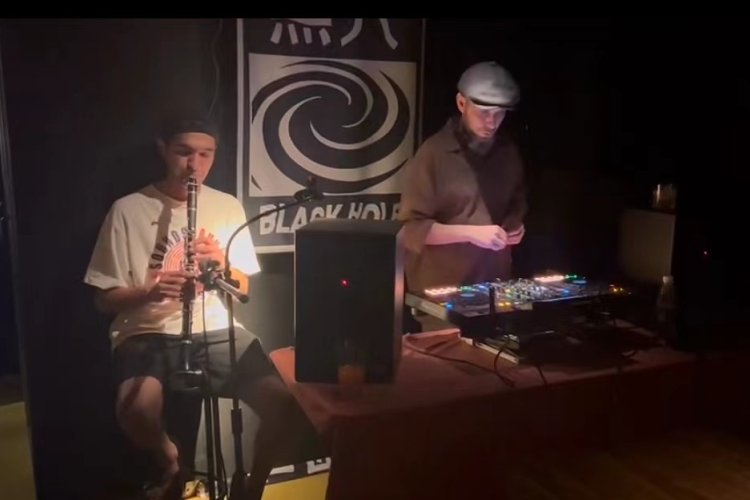Beijing, I Love You, but STFU
On Sunday night Yuja Wang played a hometown gig.
If you haven’t heard of Wang, she’s a Beijing-born concert pianist who has electrified the sometimes stuffy world of classical music with her beauty, glamor and penchant for short, tight dresses. No, put those cynical thoughts away. While her looks have no doubt helped her career, it must be pointed out that she also has dazzling technique, a fearless and distinctive musicality, and amazingly large hands. (This is a good thing, by the way.) Not yet thirty, she is one of the world’s most in-demand soloists.
Her performance was fabulous, but highlighted a couple of my bugbears about this city’s cultural life.
First, although the concert was sold out weeks in advance, there were lots of empty seats. How does that happen? Do scalpers buy them all up? Tickets were on sale on Taobao the day before, and there were a few shady characters lurking by the subway station (that’s how I got my ticket). But they can’t be making a profit, if so many seats remained unsold. Or are tickets, like at major sporting events, handed out to sponsors and corporate hospitality? Either way it’s a travesty that real fans are denied the opportunity to attend, while world-class performers are playing to halls which are only two-thirds full.
Second, there was the woman sitting next to me who talked (and giggled) all the way through. That wasn’t just bad luck, either. At every performance I’ve been to at the Egg – concert, theatre, opera – there’s been somebody talking nearby. An old schoolfriend who plays with a major London orchestra told me that Beijing audiences are notorious for it.
Perhaps it’s cultural. The audience at Peking opera talk constantly, apparently. But the noisy, percussive music of jingju has evolved to be heard over this; western classical music hasn’t. And watching people talking at the Egg I’ve developed a different theory: people genuinely believe that if you cover your mouth with your hand, nobody can hear you. This might sound crazy, but the alternative is that they’re so rude and arrogant that they don’t care. And it can’t be that, can it? After all, they bother to put their hands over their mouths.
Maybe you don’t like classical music. Fair enough. But nobody’s making you go to concerts, taking up a seat that could be used by someone who does, and spoiling it for others. I’m an atheist, but I don’t crash into church and sit there chatting. And music is my religion, it’s where I go to experience the transcendent. Really, what is so urgent that it can’t wait twenty minutes till the interval? What’s more interesting than listening to Debussy, FFS?
It’s not just the concert hall. I have yet to find a temple or shrine in Beijing where the peace isn’t disturbed by the grating drone of music played through tiny speakers at distorted volume. In fact, there’s hardly anyplace at all where you can go to experience calm and stillness. In the park, in the forest, on top of a mountain, wherever you go there’s banging, shouting, tinny music and the blare of amplified voices.
So, Beijing, why don’t you try it? Turn off the music every now and then, cease the chatter, sit quietly and breathe slowly. Listen to the sounds of nature. Nobody will think any less of you if you ease up for one minute, you’ll still be a great city. As a wise man – I think it might have been Lao Zi – once said, “Life moves pretty fast. If you don’t stop and look around once in a while, you could miss it.” Beijing, I love you, but please, sometimes, just STFU.
Photo: beckmesser.com
Related stories :
Comments
New comments are displayed first.Comments
![]() admin
Submitted by Guest on Fri, 09/02/2016 - 16:45 Permalink
admin
Submitted by Guest on Fri, 09/02/2016 - 16:45 Permalink
Re: Beijing, I Love You, but STFU
It's, first of all, important to understand that in a country that has a long history of valuing conversations and social connections as part of their opera going traditions, people have a different cultural understanding of noise. But, other than that, it's also important to know that, in the West, opera going had never used to be a quiet experience either, before the rise of modern etiquettes 200 years ago. Sitting quietly at a performance, really, is a modern, Western invention. True, Chinese people should perhaps try to adapt to this invention better because no one likes noisy theatres anymore. But failling to recognise the cultural-historical reasons for why it has been so difficult for them to be quiet (not just at the opera but literarly everywhere) is, in essense, culturally ignorant.
Above all, it is truly disappointing to read something like this published by an 'admin'. Really not cool, Beijinger.
The shoe is on the other foot, dude. By implying Beijingers do not know the difference between their own traditions and accepted norms of behavior at an international-caliber modern concert venue is for you to suggest Beijingers are uncultured, classless boobs virtually incapable of change for the past century.
It is you, in your attempt to pin an imperialist spin on the article above, that explain away Beijingers as mildly retarded people who cannot control their basest primal urges, like stubborn donkeys. "How dare you look down upon these brutes, oh westerner, for they cannot overcome their centuries of bad habits," you seem to be implying. "You should no sooner scold a cripple for limping than expect these beasts to adhere to common courtesy."
In fact, as I stated above, almost all Chinese understand you are to remain quiet during a performance that is not jingju or rock concert loud, be it western violin or Chinese zither.
However, all it takes is a handful of disrespectful individuals to ruin it for everyone, and it is this crowd that the author of this piece is railing about.
As evidence for the capacity for local people to adapt to cultural change in the exact same enviroment, attend a jingju performance at the National Theater and check for people eating sunflower seeds and spitting them on the floor as they most likely did 100 years ago (and frankly, most appropriately and happily continue do if they are watching an outdoor performance on a dirt lot or cement clearing in the park). You will not, because there is a basic understanding that things are not the same in a state-of-the-art 21st century concert hall.
It is you who should feel ashamed of your cultural snobbery and disrespect to local culture mavens, not me.
![]() AndrewKilleen
Submitted by Guest on Fri, 09/02/2016 - 16:34 Permalink
AndrewKilleen
Submitted by Guest on Fri, 09/02/2016 - 16:34 Permalink
Re: Beijing, I Love You, but STFU
Thanks for that link, interesting read!
![]() AndrewKilleen
Submitted by Guest on Fri, 09/02/2016 - 16:19 Permalink
AndrewKilleen
Submitted by Guest on Fri, 09/02/2016 - 16:19 Permalink
Re: Beijing, I Love You, but STFU
I think you're missing my point about jingju. It's not "just" noisy, and by adding that word you've changed the meaning of the sentence- but it has clearly evolved against a background of noise. I wouldn't expect silence at a performance, because I'm aware of the cultural norms. But Yuja Wang is trained in the western tradition and was playing works by western composers. I'd suggest the ignorance here lies with those who disrespect the performer and spoil the enjoyment of others because they can't keep quiet for twenty minutes.
![]() Steven Schwankert
Submitted by Guest on Fri, 09/02/2016 - 09:20 Permalink
Steven Schwankert
Submitted by Guest on Fri, 09/02/2016 - 09:20 Permalink
Re: Beijing, I Love You, but STFU
![]() admin
Submitted by Guest on Thu, 09/01/2016 - 17:45 Permalink
admin
Submitted by Guest on Thu, 09/01/2016 - 17:45 Permalink
Re: Beijing, I Love You, but STFU
^ i call bullshit on that comment.
Except for the most uneducated peasant farmer in from the countryside (who generally would not be in the western opera house classical music performance to begin with), everyone in Beijing who answers their phone or chats loudly at a performance like this knows its a fucking disgrace. They just don't give a shit about affecting other peoples' enjoyment and consider the fulfilment of their personal agenda to be far more important than respect for others.
You're right that it has nothing to do with culture. It has entirely to do with self-centered disregard for courteous public behavior.
![]() Candy1988
Submitted by Guest on Tue, 08/30/2016 - 23:47 Permalink
Candy1988
Submitted by Guest on Tue, 08/30/2016 - 23:47 Permalink
Re: Beijing, I Love You, but STFU
Bart Simpson is smarter than me.
![]() PatrickLi
Submitted by Guest on Tue, 08/30/2016 - 10:55 Permalink
PatrickLi
Submitted by Guest on Tue, 08/30/2016 - 10:55 Permalink
Re: Beijing, I Love You, but STFU
I’m an atheist, but I don’t crash into church and sit there chatting.
Quote of the day.
![]() britomart
Submitted by Guest on Mon, 08/29/2016 - 16:34 Permalink
britomart
Submitted by Guest on Mon, 08/29/2016 - 16:34 Permalink
Re: Beijing, I Love You, but STFU
Yeah, I had to stop attending concerts here after going to see Itzhak Perlman years ago at the Egg. Perlman actually stopped about a minute into one of his pieces and asked the audience (very nicely) to be quiet.
I was so embarrassed for the people in the audience. What made it worse was that everybody sitting around me in the cheap seats--parents with their aspiring violinist offspring, all between the ages of 5 and 15--were absolutely silent, sitting on the edge of their seats, enraptured by the music and the whole experience, being in the presence of a master. It was the folks in the pricey seats down front who just wouldn't shut up... there just to show off their money, position, ...? Pearls before swine...
I haven't been to a concert here since.
![]() AndrewKilleen
Submitted by Guest on Mon, 08/29/2016 - 12:23 Permalink
AndrewKilleen
Submitted by Guest on Mon, 08/29/2016 - 12:23 Permalink
Re: Beijing, I Love You, but STFU
To quote Bart Simpson: "There's a five o'clock in the a.m. now?"
![]() Candy1988
Submitted by Guest on Mon, 08/29/2016 - 00:01 Permalink
Candy1988
Submitted by Guest on Mon, 08/29/2016 - 00:01 Permalink
Re: Beijing, I Love You, but STFU
Well, beijing is not always noisy. You just need to pick the right time.
When I walk my dog at around 5 a.m., it's quite peaceful, with birds singing accompanied by crickets and the sound of clapping by leaves from time to time.
Validate your mobile phone number to post comments.







